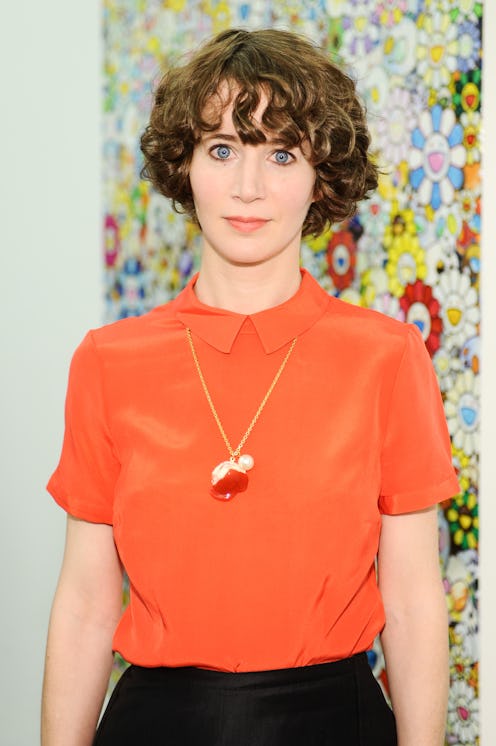Books
8 Absurdly Wonderful Miranda July Moments
Happy birthday, Miranda July! The wide-eyed, mop-topped writer/director/performance artist/email curator turns 40 today, and even though it's the middle of February, we find ourselves in a very July mood.
Throughout her career, July's eccentric and vivid voice has sprinkled insight and joy into her films, fiction, and projects. Her work is so distinctive, she deserves naming rights to a Crayola crayon color. (It might be a bright yellow.) It'd be difficult to choose what medium she was born to create; each has her signature bubbly touch. Her films are definitely a bit wacky, but they propose insights about the connections we all crave. July's short stories demonstrate her skill at experimenting with craft. And anyone who signed up for "We Think Alone" — in which she accumulated and sent out 20 emails from Lena Dunham, Kirsten Dunst, Kareem Abdul-Jabbar, among others, about topics like money and anger — appreciates her ability to tap into humanity-wide realities.
To celebrate another year of July's trademark quirk and curiosity, let's review some of her most fun, moving moments in both film and print.
1. The Dark Shape
When I was fifteen, a dark shape came in to my room at night. It was dark, but it glowed, which is the first of many facts you will have to tackle with your imagination. It wasn't in the shape of a person, but right away I knew it was like a person in every way except for how it looked. As it turns out, our looks are not the main thing that makes us human.
—"Making Love in 2003," from No One Belongs Here More Than You
2. Poop Back and Forth Forever
—You and Me and Everyone We Know
3. The Birthmark's Reappearance
He was looking at her cheek. She instinctively put her hand on the mark and ran to the bathroom.
She was in there for a long time. Maybe thirty minutes. You've never had thirty minutes like these. She stared at the port-wine stain and she breathed in and she breathed out. It was like being twenty-three again but she was thirty-eight now. Fifteen years without it, and now here it was.
—"Birthmark," from No One Belongs Here More Than You
4. This Person's Party (and Mail)
This person suddenly feels the need to check her post office box. It is an old habit, and even if everything is going to be terrific from now on, this person still wants mail. This person says she will be right back and everyone this person has ever known says, Fine, take your time. This person gets in her car and drives to the post office and opens the box and there is nothing. Even though it is a Tuesday, which is a famously good day for mail.
—"This Person," from No One Belongs Here More Than You
5. How A Character's Tree Planting is Like Writing or Loving
"I knew that in the end of the movie he would realize he was selling trees not because he thought it would help anything—he actually felt it was much too late for that—but because he loved this place, Earth. It was an act of devotion. A little like writing or loving someone—it doesn’t always feel worthwhile, but not giving up somehow creates unexpected meaning over time."
—It Chooses You
6. The Shirt Dance
—The Future
7. On Stealing
It goes without saying that I used magnets to reset the Kinko’s copy counters to zero, and carried scissors to cut alarm tags out of clothes. Everyone I knew did these things. I say this not to excuse myself but just so you can visualize a legion of energetic, intelligent young lady criminals. Anytime anyone we knew flew into Portland, we urged her to buy luggage insurance and allow us to steal her bag from the baggage carrousel. The visiting friend then had to perform the role of the frantic claims reporter and was given a cut of the insurance money.
8. The Basement
We were making some renovations; specifically, we were building a basement. Our apartment was tiny, but the ceilings were tall, and there was a tantalizing amount of unused space above our heads. Pip thought lofts were for hippies, so even though our studio was on the second floor, she had sketched out a design that would allow us to live on a low-ceilinged main floor, and then, when feeling morose, descend a ladder to the basement.
—"Something That Needs Nothing"
Image: Getty Images
